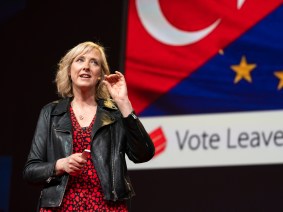Social media has been widely regarded as a menacing force that poses a significant threat to democracy. However, in her thought-provoking speech at TED2019, journalist Carole Cadwalladr challenges this popular notion and raises doubts about the extent of social media’s impact on democratic processes.
The Overblown Narrative: Separating Fact from Fiction
Contrary to the prevailing narrative, Cadwalladr questions whether social media truly wields the power to single-handedly dismantle democracies. She argues that while platforms like Facebook have undoubtedly played a role in spreading misinformation and manipulating public opinion, it is crucial not to overlook other factors such as traditional media and political campaigns.
Cadwalladr highlights how social media can amplify existing biases rather than solely creating them. By targeting specific demographics with tailored content, these platforms may inadvertently reinforce pre-existing beliefs instead of actively shaping new ones. This challenges the notion that social media alone is responsible for polarizing societies and undermining democratic values.
A Complex Web of Influence: Unraveling the Truth
In her talk, Cadwalladr delves into the intricate web of influence behind modern-day elections. She emphasizes how data-driven campaigning techniques employed by political parties are often overlooked when discussing threats to democracy posed by social media giants.
By meticulously analyzing voter behavior through sophisticated algorithms, political campaigns can effectively target individuals with personalized messages across various digital channels – including but not limited to social media platforms. This multifaceted approach blurs the line between online manipulation and offline tactics, making it difficult to attribute all blame solely on social networks.
Rethinking Solutions: Moving Beyond Blaming Social Media Alone
While acknowledging the need for regulation and accountability in the digital realm, Cadwalladr urges society to adopt a more nuanced approach when addressing threats to democracy. Merely scapegoating social media platforms without considering the broader context may hinder our ability to tackle underlying issues effectively.
In conclusion, Carole Cadwalladr’s TED2019 talk challenges the prevailing narrative that portrays social media as an all-encompassing threat to democracy. By questioning its exclusive role in shaping public opinion and highlighting other influential factors at play, she encourages us to reevaluate our understanding of this complex issue. It is crucial that we move beyond simplistic explanations and explore comprehensive solutions that address the multifaceted nature of democratic challenges in today’s digital age.
